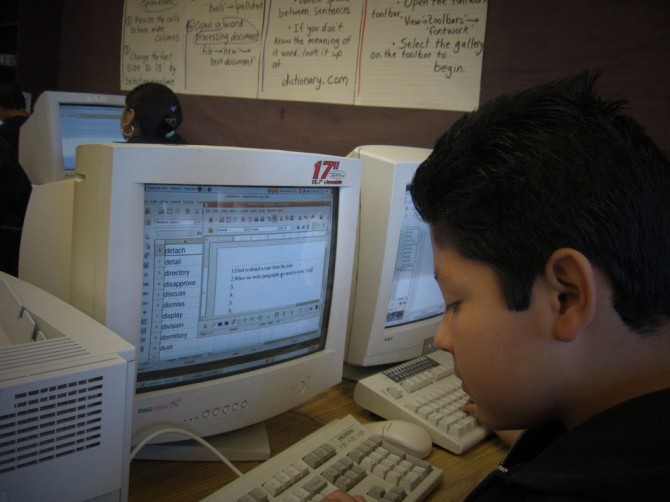A school teacher assembled a computer class out of 70 Linux PCs for free.
Robert Litt is a school teacher with a very modest budget in Auckland (USA) and is a great computer technology enthusiast. Working at a school, where there is not a single computer for students, led him to the idea that such a situation is at least unacceptable and something needs to be done about it.
Robert set to work. As a member of a number of social networks, he distributed a record, from which it follows that he is a school teacher of computer science at a school without a single computer and will be very grateful to those who can donate their old cars to the school, which usually stand in the storeroom, take up space, become covered dust, but throw that hand simply does not rise. As it turned out, there are quite a few such people, and soon Robert received as many as 18 old computers released after 2002, whose approximate characteristics were modest - 512 MB RAM and 60 GB HDD - but that was still much better than nothing.
Robert sat down to figure out what was wrong with computers and why the old owners didn't use them. Much to his great surprise, it turned out that almost all the computers turned out to be workable - it was possible to bring them to their senses by reformatting the disk and installing the new system, and they were unnecessary because of the slow work of the installed Windows, which were infested with viruses and other software that slows down the system.
The purchase of licensed copies of Windows, even taking into account discounts for the educational institution, was not even considered by the school’s management - Robert’s personal initiative was his personal problem, and he came up with a way to solve it. He joined the local Linux User Group, whose members easily agreed to help the schoolteacher and took the responsibility of installing a free and licensed Ubuntu to all computers.
')
Robert's actions did not go unnoticed. Computers continued to go to school and soon it became possible to create a whole computer lab of 70 computers with a dedicated server, where students were able to quite effectively and comfortably perform most of the tasks in Robert’s classes - working with text editors, spreadsheets, image processing, writing music on a simple synthesizer and, of course, safe work on the Internet - including the creation of simple websites on Google Sites.

UPD : School management turned out to be quite an initiative of its employee, and now Robert has official free time - four hours - to continue his successful work. (Thank you k12th , I apologize for the inaccuracy)
[ Source ]
Robert set to work. As a member of a number of social networks, he distributed a record, from which it follows that he is a school teacher of computer science at a school without a single computer and will be very grateful to those who can donate their old cars to the school, which usually stand in the storeroom, take up space, become covered dust, but throw that hand simply does not rise. As it turned out, there are quite a few such people, and soon Robert received as many as 18 old computers released after 2002, whose approximate characteristics were modest - 512 MB RAM and 60 GB HDD - but that was still much better than nothing.
Robert sat down to figure out what was wrong with computers and why the old owners didn't use them. Much to his great surprise, it turned out that almost all the computers turned out to be workable - it was possible to bring them to their senses by reformatting the disk and installing the new system, and they were unnecessary because of the slow work of the installed Windows, which were infested with viruses and other software that slows down the system.
The purchase of licensed copies of Windows, even taking into account discounts for the educational institution, was not even considered by the school’s management - Robert’s personal initiative was his personal problem, and he came up with a way to solve it. He joined the local Linux User Group, whose members easily agreed to help the schoolteacher and took the responsibility of installing a free and licensed Ubuntu to all computers.
')
Robert's actions did not go unnoticed. Computers continued to go to school and soon it became possible to create a whole computer lab of 70 computers with a dedicated server, where students were able to quite effectively and comfortably perform most of the tasks in Robert’s classes - working with text editors, spreadsheets, image processing, writing music on a simple synthesizer and, of course, safe work on the Internet - including the creation of simple websites on Google Sites.

UPD : School management turned out to be quite an initiative of its employee, and now Robert has official free time - four hours - to continue his successful work. (Thank you k12th , I apologize for the inaccuracy)
It was
The school leadership turned out to be quite an initiative of its employee and as a reward Robert was allowed to conduct in the computer class, built thanks to his efforts, as many as 4 lessons per week.
The school leadership turned out to be quite an initiative of its employee and as a reward Robert was allowed to conduct in the computer class, built thanks to his efforts, as many as 4 lessons per week.
[ Source ]
Source: https://habr.com/ru/post/150533/
All Articles